Sternberg Press
Sternberg Press

Routes/Worlds
Elizabeth Povinelli's anthropology of the otherwise locates itself within forms of life that run counter to dominant modes of being under late settler liberalism. In these essays, she considers the emergence of new worlds and the extinguishment of old ones, seeking to develop a social imaginary that can sustain radical potentiality without turning a blind eye to our deep interdependence.
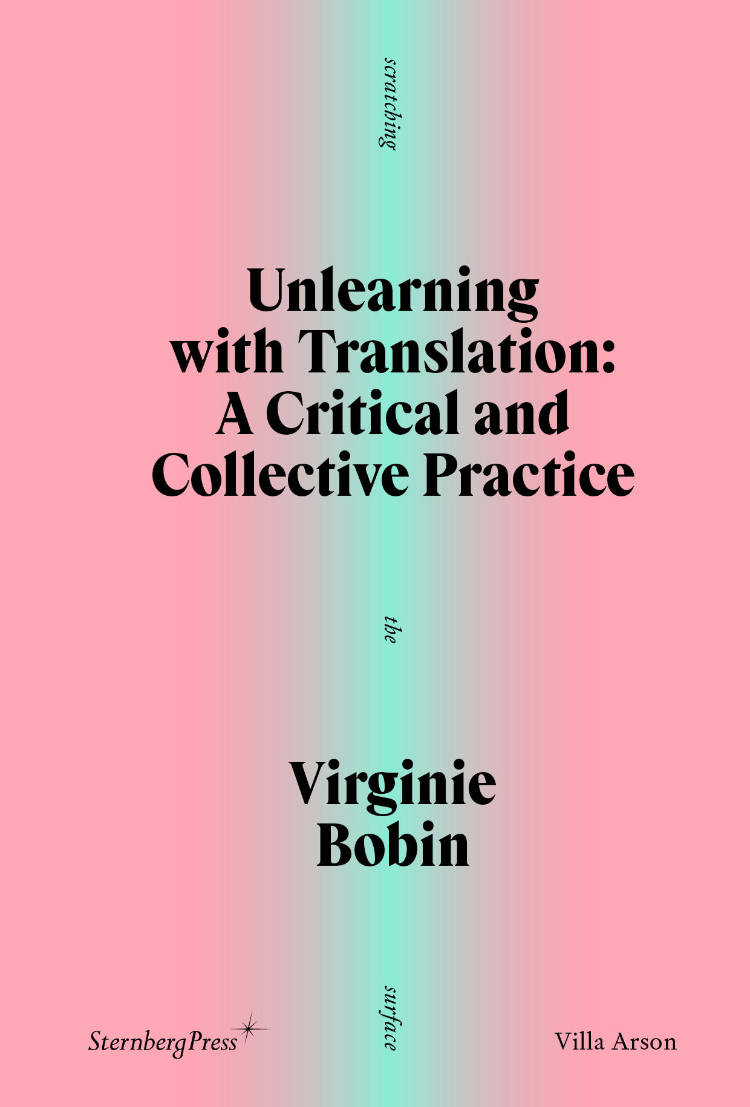
Unlearning with Translation – A Critical and Collective Practice
The act of translation as a pedagogical tool, a political act, and ultimately a gesture of care in these tense cultural times.
Based on practical experiments, Unlearning with Translation posits the act of translation as a pedagogical tool, a political act, and ultimately a gesture of care in these tense cultural times. Written by French curator, writer, editor, and self-taught translatress Virginie Bobin, the essay revisits a series of workshops, exhibitions, and other collective activities that took translation as both subject and method to unsettle entrenched conceptions of language, identity, and belonging. In particular, the ambiguous notion of "untranslatability" is used as a lens through which to examine the power relations at play in those institutional, economic, and political contexts inhabited by art workers. Alongside collaborations with artists including Mercedes Azpilicueta, Serena Lee, and Mounira Al Solh, Bobin's reflections are grounded in her experience co-founding and facilitating the editorial and curatorial platform Qalqalah قلقلة†, which relies on translation as a tool for the production and publication of situated knowledge in three languages—French, Arabic, and English. Informed by feminist genealogies and methodologies throughout, the book maintains that collective labor and relations are key aspects of any critical practice, as exemplified in the concluding correspondence with Andrea Ancira.
Virginie Bobin operates across research, curatorial and editorial practices, writing, pedagogy and translation, with a particular interest in performance, experimental forms of artistic research, the role of art, artists and art institutions in the public sphere, and formats that exceed that of the exhibition. Between 2009 and 2018, she has worked for various art centers and residency programs (Villa Vassilieff, Bétonsalon, Witte de With, Les Laboratoires d'Aubervilliers, Performa). She is a Doctor in Artistic Research (PhD-in-Practice, Academy of Fines Arts, Vienna, 2023), a professor in Art and Social Practices at ésadhar (Rouen, since 2024), and a co-founding member of the editorial and curatorial platform Qalqalah قلقلة. In addition to her contributions to various international journals, she has edited the collective publications Composing Differences (Les presses du réel, 2015), Republications (with Mathilde Villeneuve, Archive Books, 2015), and Bestiario de Lengüitas (with Mercedes Azpilicueta, k.verlag, 2024).
Edited by Alice Dusapin and Sophie Orlando.
Contribution by Andrea Ancira.
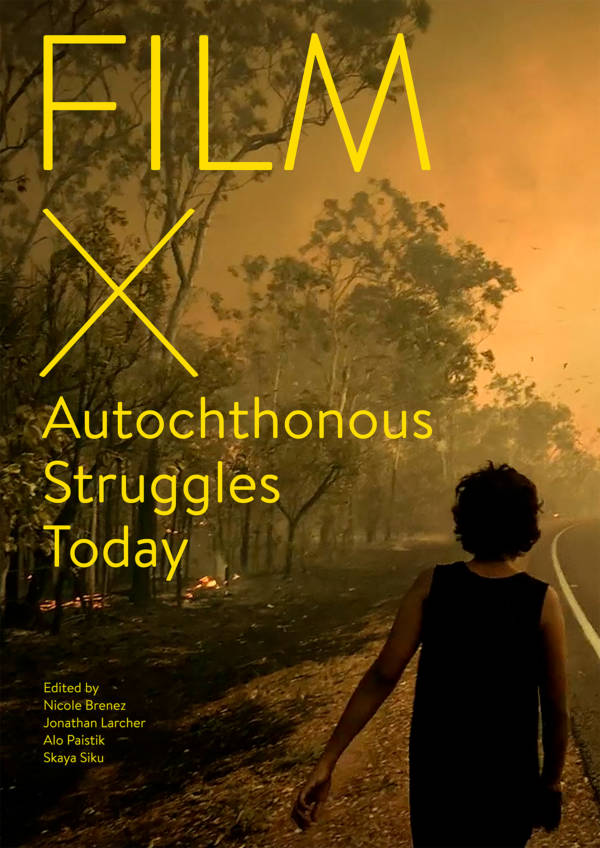
Film X Autochthonous Struggles Today
Nicole Brenez, Jonathan Larcher and 2 more
First global exploration of contemporary forms of filmmaking from political and cultural self-determination movements of Autochthonous communities and peoples.
Film X Autochthonous Struggles Today brings together for the first time filmmakers, activists, film curators, and scholars who share a common interest in filmmaking practices that emerge from and participate in the various situations of struggle that the Autochthonous/Indigenous/Native/Aboriginal/First Nations peoples and communities are involved in worldwide.
Starting with the Edison Studio's 1894 short films Buffalo Dance and Sioux Ghost Dance, representations of Autochthonous peoples have been part of cinema right from its inception. The vast majority of these representations, however, have not been produced by nor for Autochthonous peoples. In the wake of political and cultural self-determination movements of the 1960s and 1970s, and with the gradual democratization and accessibility of the tools of moving-image making, Autochthonous communities have displaced and renewed cinema's forms and means of production, increasingly reclaiming their right for self-representation by way of film and video.
Along with the vibrant forms of moving images arising from within the communities, close to their existential political concerns, filmmaking has also become a potent tool in Autochthonous struggles. This book answers the need to take a global look at the diverse ways of filmmaking that fight for land rights and against environmental injustice (Brazil, Morocco, Taiwan, USA), that resist neocolonial domination, economic and political exploitation (Japan, Philippines), that offer a counterpoint during low intensity or drawn-out armed conflicts (Colombia, Mexico), that invent strategies of counter information and representation (Australia, Canada, Russia, Samoa), and that strive for visibility.
Contributions by Myrla Baldonado, Mayaw Biho, Nadir Bouhmouch, Ricardo Matos Cabo, Carolina Canguçu, Amaranta Cesar, Karrabing Film Collective, Rupert Cox, Nicolas Défossé, Etienne De France, Sophie Gergaud, John Gianvito, David Harper, Aurélie Journée-Duez, Blackhouse Lowe, Caroline San Martin, Laura Langa Martínez, Isael Maxakali, Sueli Maxakali, Dan Taulapapa Mcmullin, Chie Mikami, Francisco Vázquez Mota, Omar Moujane, Marie Pierre-Bouthier, Perrine Poupin, Ariel Arango Prada, Beatriz Rodovalho, Roberto Romero, Jonathan Sims, Mercedes Vicente, Jamahke Welsh.
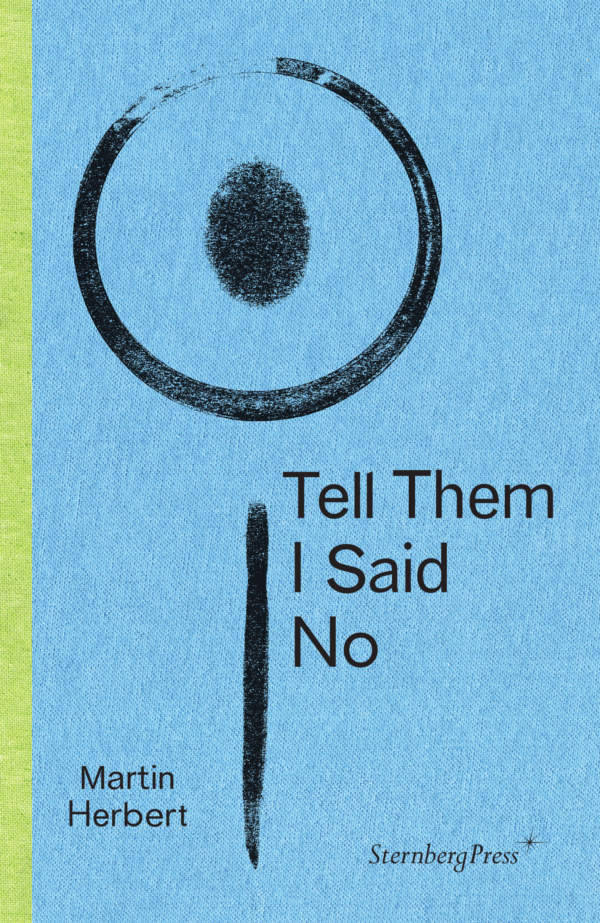
Tell Them I Said No
This collection of essays by Martin Herbert considers various artists who have withdrawn from the art world or adopted an antagonistic position toward its mechanisms (essays on Lutz Bacher, Stanley Brouwn, Christopher D'Arcangelo, Trisha Donnelly, David Hammons, Agnes Martin, Cady Noland, Laurie Parsons, Charlotte Posenenske, and Albert York).
A large part of the artist's role in today's professionalized art system is being present. Providing a counterargument to this concept of self-marketing, Herbert examines the nature of retreat, whether in protest, as a deliberate conceptual act, or out of necessity. By illuminating these motives, Tell Them I Said No offers a unique perspective on where and how the needs of the artist and the needs of the art world diverge.
2nd edition (2025).

Planetary Realism – Art Against Apocalypse
Traditions of realism are brought together with the decolonial and ecological concept of "planetarity" to understand a new realism in contemporary art.
The devastation left in the wake of modernity and globalization is revealing a fragile and unfamiliar planet, and humanity has awakened to a new real. If the old "realist" tools of objectivism have contributed to capitalist society's divorce from the natural world, how are artists finding new ways to make us really see—and feel—the planet?
Surveying a body of planet-facing art, communal practices, and activism, Josephine Berry investigates art's power to break with capitalist realism and decarbonize the imagination. With chapters on feeling as world-making, the rupture of petroleum landscapes, artists' urban exodus, and migration as survival, Planetary Realism delves deeply into art's necessary reimagining of life on Earth.
"Planetary Realism is a deeply necessary book to add to our toolkit of struggle against a corporate world intent on destroying our planet for nothing but profit. Berry's book is a wake up call to artists and all those whose imaginations have not been destroyed by the consensensual silence surrounding the life or death issue of climate catastrophe. She dismantles the concept of art's autonomy to describe how artists all over the world are becoming artworkers for Planet Earth." — Peter Kennard, London-based artist and activist, and Emeritus Professor of Political Art at the Royal College of Art
"Through this superlative and vigorously argued version of a realism for today—meticulously attuned to planetary predicaments and the art and culture that inhabits them—Berry gives us means to map ways of being more hospitable, disobedient, migratory, alive, in the present." — Matthew Fuller, co-author of Bleak Joys: Aesthetics of Ecology and Impossibility, and Investigative Aesthetics: Conflicts and Commons in the Politics of Truth
Josephine Berry is an art theorist, writer and editor. She supervises thesis only and practice based PhDs in the School of Arts and Humanities, Royal College of Art, London, and teaches in Media Communication and Cultural Studies at Goldsmiths, University of London. She is a member of Mute magazine's editorial collective Mute and is a peer reviewer for the journal Theory, Culture & Society.
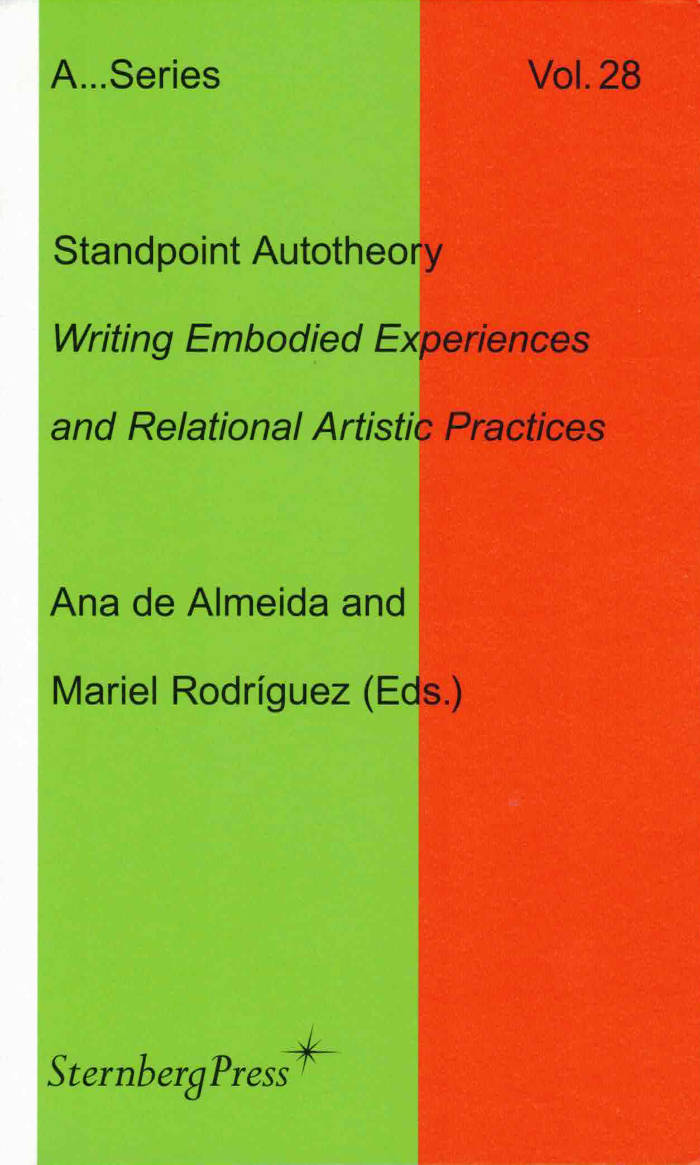
Standpoint Autotheory – Writing Embodied Experiences and Relational Artistic Practices
Ana de Almeida, Mariel Rodríguez
In this anthology of essays, twelve artists explore radically self-reflexive research attitudes integrating embodied experiences within the production of theory.
Standpoint Autotheory encompasses a multitude of manifestations of radically self-reflexive research attitudes. It traces research based artistic practices through twelve contributions that propose a performative integration of the personal within the production of theory and explore the entanglements of subjectivity with criticality aimed at social transformation by questioning dominant epistemologies.
The positions assembled in the book are permeated by different modes of thinking and practice such as autoethnography, practices of the self, auto-historia teoría, standpoint theories, strong objectivity and situated knowledge, self-authority, narrativity and storytelling, radical positioning, performative philosophy, autofiction, thinking-feeling, and other methods that, through the interrogation of embodied experiences, illuminate the connections between the personal and the political, as well as the individual and the communal.
Edited by Ana de Almeida and Mariel Rodríguez.
Contributions by Ana de Almeida, andrea ancira, Cana Bilir-Meier, Nina Hoechtl, Olena Khoroshylova, Sanja Lasić, Mai Ling, Stephanie Misa, Lena Ditte Nissen, Mariel Rodríguez, Ruth Sonderegger, Elif Süsler-Rohringer, Verena Melgarejo Weinandt.
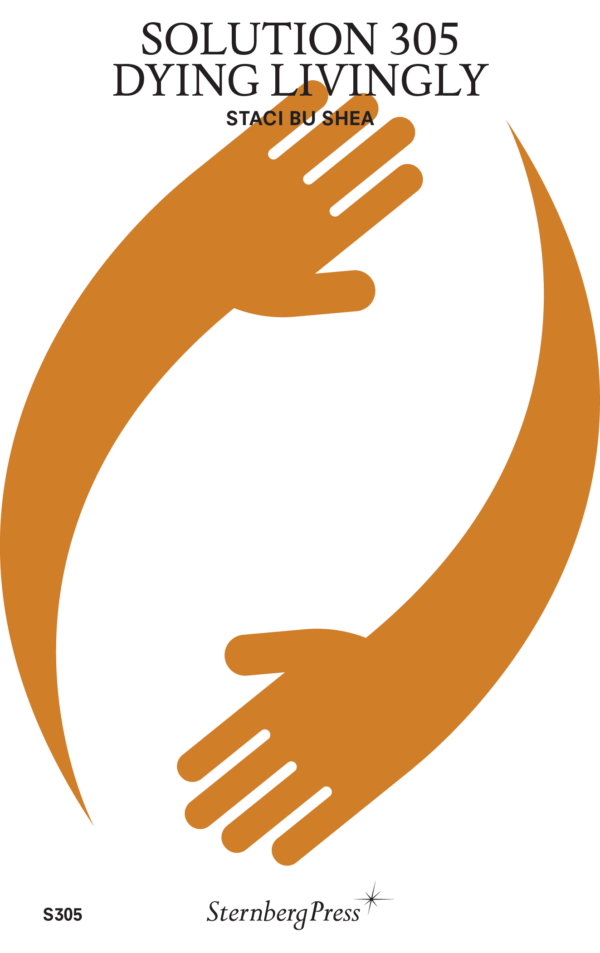
Solution 305 – Dying Livingly
A series of propositions and encounters in service to an aesthetic, critical, and poetic experience of living life led by death.
Part studious, part visceral, Dying Livingly is a collection of short essays written in the first few years of the author's holistic deathcare research and practice. With a focus on the truth of impermanence and the material cultures of death and dying, the writing reaches toward a future of compassionate, community-centered deathcare.
Death has been outsourced, medicalized, and commodified for over a century. Existing at a threshold of innovation and transformation today, death is not a plight to master or transcend but a reality of insistent change requiring our humble surrender. Working in tandem with the possibilities and limits of medicine, the holistic deathcare movement aims to support people and their communities in death literacy and phobia. It stewards both ancient and new practices in deathcare and centers social, political, and ecological imperatives for how we die.
If death is an amplification of living, the attention here is on bearing witness to life in and around the dying and the potential to contribute to a more vibrant culture of care. Living a death-oriented life is not simply for those and their loved ones navigating a terminal diagnosis and finite amount of time to live; it is for all of us. Death awareness leads to a valuing of life, which is urgently needed for justice, healing, and our livability.
With fervor and deep reverence, this collection demonstrates that what is needed above all is a presence—simple but challenging—that refuses to look away as life slips from our grip. In this light, the writing details lessons in what it means to be prepared for death but also impossibly ready. Death is a horizon that inspires us to live fully, with the vulnerability necessary in the transformative process of giving and receiving care.
Staci Bu Shea (born 1988 in Miami) is a curator, writer, and holistic death care worker based in Utrecht, the Netherlands, focusing on aesthetic and poetic practices of social reproduction and care work, as well as its manifestations in interpersonal relationships and daily life, community organizing and institutional practice.

The Contemporary Condition - Contemporaneity in Embodied Data Practices
Cornelia Sollfrank, Felix Stalder
What parallels are there between a human pranayama practitioner and a migratory bird in heavily datafied environments? In Contemporaneity in Embodied Data Practices, two artistic field studies provide the starting point for a dialogical reflection on the entangling of diverse temporalities in body-related, datafied, and experiential practices. Shifting through biological, historical, and technological rhythms, Cornelia Sollfrank and Felix Stalder unfold their respective more-than-human frames of reference and arrive at specific forms of agency in the contemporary moment. Published in partnership with the Centre for Research in Artistic Practice under Contemporary Conditions at Aarhus University.

The Disintegration of a Critic
Thirty texts by cultural critic, auto/biographer, and lesbian icon Jill Johnston.
Jill Johnston was renowned as a writer on dance, especially on the developments around Judson Dance and the 1960s downtown New York City scene, and later as the author of the radical-feminist classic Lesbian Nation (1973). This book collects thirty texts by Jill Johnston that were initially published in her weekly column for The Village Voice between 1960 and 1974. The column provided a format in which Johnston could dissolve distinctions between the personal, the critical, and the political. Her writing took turns and loops, reflecting its times and contexts, and set a stage for the emergence of Johnston as a public figure and self-proclaimed radical lesbian that defied any prescribed position.
Johnston's original texts are accompanied by three new contributions by Ingrid Nyeboe, Bruce Hainley, and Jennifer Krasinski, as well as an appendix with archival material related to a panel Johnston organized in 1969, titled “The Disintegration of a Critic: An Analysis of Jill Johnston.”
Edited by Fiona McGovern, Megan Francis Sullivan, Axel Wieder.
Texts by Jill Johnston; contributions by Bruce Hainley, Jennifer Krasinski, Ingrid Nyeboe.

Alternative Pedagogical Spaces – From Utopia to Institutionalization
A critical exploration of the values and qualities inherent in independent educational organizations and the hurdles in the way of remaining "alternative" with the passing of time.
Grounded in empirical research, Alternative Pedagogical Spaces: From Utopia to Institutionalization is a critical inquiry into the establishment, development, and transformation of alternative pedagogical and social spaces. Written by Anna Colin, a former director and co-founder of Open School East, an independent art school and community space founded in London in 2013, this essay-length book explores the instituting factors, organizational life cycles, and alignments and misalignments between values and practices that permeate such a project. The essay delves into the qualities and prerequisites for what Colin calls "multi-public educational organizations." It also scrutinizes the hurdles associated with the effort to remain alternative, including processes of habituation, temptation or pressure to scale up, ethos-bending fundraising exercises, and long tenure, as well as the plain desire for stability and sustainability.
Alternative Pedagogical Spaces proposes where to look for a reconceptualization of waiting, slowness, and longevity, and asks how these ideas may benefit cultural practice and the design of future institutions (or the redesign of existing ones). Overriding the common assumption that success equals longevity, the author searches for institutional models that resist chrononormativity, drawing from social movements, psychotherapy, biology, and permaculture.

Writings and Interviews
The collected writings of artist Marc Camille Chaimowicz, along with the stories behind them told by Alexis Vaillant.
Marc Camille Chaimowicz was an acclaimed visual artist known for his performances, installations and curatorial flair. He was also a writer. This volume, the first comprehensive collection of writings by the artist, includes seminal interviews, chitchats, jokes, performance reports, insightful statements and letters in essay form, as well as rare documents, such as early surviving leaflets, typewriter handouts and hard-to-find articles. Spanning 1971–2023, the book unlocks the work of an artist considered to be a refreshing role model for a new generation of culture mavens and style savants.
Drawing from literature, modernist architecture, interior design, art theory, glam rock and camp culture, the collection reveals the artist's inner self alongside the art, social flânerie and the goings-on of his time. Entertaining and witty, the texts stand out brilliantly with their early acumen and inclusivity, while setting a new template for an expression of queerness through writing. With access to Chaimowicz's personal material and photographs, curator and editor Alexis Vaillant is a guide to the artist's writings. Vaillant provides behind-the-scenes commentary and context—a time capsule of pleasure featuring Andy Warhol, Des Esseintes, Josef Frank, David Bowie, Vito Acconci, Eileen Gray, Alex Kapranos, Jean Cocteau, Elsa Schiaparelli, Jean Genet, Bob Dylan, Emma Bovary and Roger Cook, among others.
Edited by Alexis Vaillant.
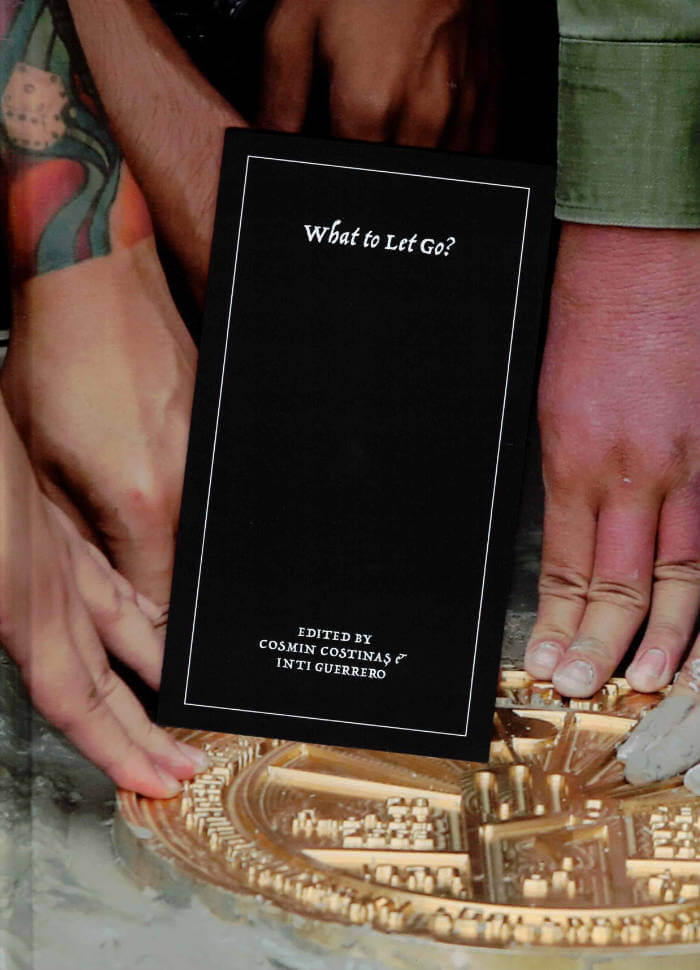
What to let go?
Cosmin Costinaş, Inti Guerrero
What gets counted within the category of heritage, and who gets to do the counting?
This book contributes to discussions about what counts as heritage now, who gets to do the counting, and broader related issues around the subject of cultural sovereignty. It unpacks historical narratives and political memories linked with objects, sites, and ceremonies that have been lost, looted, restituted, repatriated, revived, or reinvented. Through its diverse line-up of discourse, poetry, and original artistic contributions, it weaves together subjects and geographies that are not usually part of the same conversation —from plundered cultural belongings held in colonial collections, to processes of renaming or removing symbols of past eras— and considers how they relate in the context of recent social upheavals and political processes across continents.
In our era of dangerous revisionism, when history has become a battlefield for both the left and the right, we are asking: How can art reconfigure our collective foundational myths? And of what should we let go on the journey towards figuring it out?
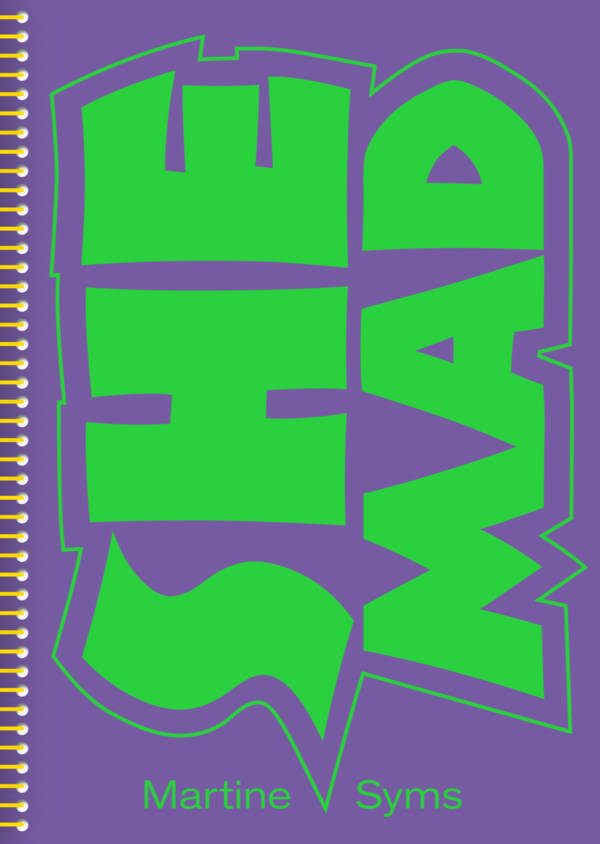
She Mad
She Mad gathers materials and documentation on Martine Syms' seminal episodic project of the same name. Each episode of this series takes a different format, using various narrative formats, from sitcoms to TikTok videos, and includes filmed footage as well as research materials. Each episode revolves around a protagonist, also named Martine—an overachieving, stoner graphic designer who lives in Hollywood and wishes she were an important artist.
The first episode Pilot for a Show about Nowhere (2015) merges a semi-autobiographical account of Syms' own life as a young black woman with a video essay-like narrative on the history of commercial television and its assumed target audiences. The episode Laughing Gas (2016) draws on early cinema, specifically the 1907 silent film of the same name by Edwin Porter, one of the earliest examples of a black female actress, Bertha Regustus, performing an independent role on-screen. Intro to Threat Modeling (2017) is told through email exchanges, screengrabs, and an avatar, outlining the effects of surveillance on subjectivity. The episode Bitch Zone (2020) takes us to an empowerment programme for teenage girls founded by supermodel and business mogul Tyra Banks.
Published on the occasion of the exhibition She Mad – Season One at Bergen Kunsthall, Norway and the Museum of Contemporary Art, Chicago, USA.
Martine Syms (born 1988 in Los Angeles) is an American interdisciplinary artist who has earned wide recognition for a practice that combines conceptual grit, humor, and social commentary. Her works explore how mass media shapes and frames identities and cultures. Drawing from early cinema, television, the internet, social media, and ambient footage produced by phones and surveillance, Syms addresses the ways in which representations of black identity and gender appear in the public imagination.
Edited by Axel Wieder.
Texts by Jadine Collingwood, William Pym, Axel Wieder.
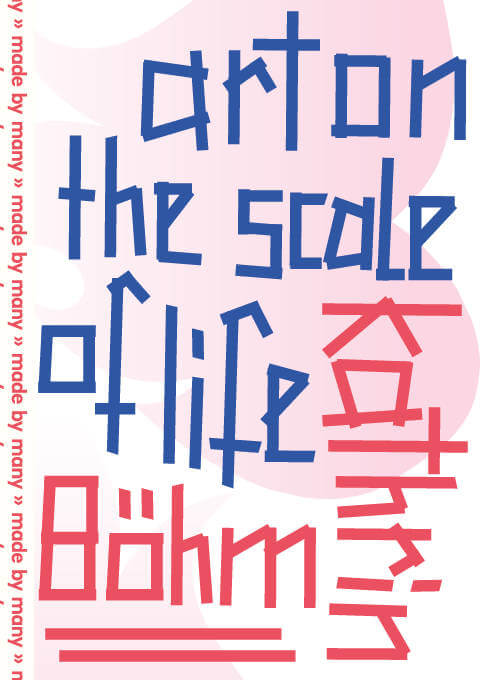
Art on the Scale of Life
A comprehensive overview of artist Kathrin Böhm's multifaceted, deeply collaborative, and durational practice and networks.
This volume critically profiles, contextualizes, and theoretically elaborates the unique practice of the UK-based German artist Kathrin Böhm. Combining visual and textual material, it offers an overview of Böhm's exceptional modus operandi that is rooted in a highly original artistic synthesis of a range of practices. Over the last three decades, Böhm has expanded the terms of socially engaged ways of working to an unprecedented scale and breadth by producing complex organizational, spatial, visual, and economic forms. These often entail the production of complex infrastructures, manifested via projects such as Culture is a Verb (2018–21), The Centre for Plausible Economies (2018–ongoing), Company: Movements, Deals and Drinks (2014–ongoing) and the Eco-Nomadic School (2010–ongoing). The book follows a major mid-career exhibition at The Showroom, London, in 2021.
Offering a significant addition to debates on contemporary art and architecture, social action, and public culture, Kathrin Böhm: Art on the Scale of Life brings together critical reflections by internationally acclaimed contributors. Spanning a wide range of critical positions and disciplines, these include Dave Beech, Céline Condorelli, Elvira Dyangani Ose, Wapke Feenstra, Katherine Gibson, Joon-Lynn Goh, Lily Hall, Yolande Zola Zoli van der Heide, Grace Ndiritu, Gerrie van Noord, Paul O'Neill, Doina Petrescu, Gregory Sholette and THEMM!!, Kuba Szreder, Gavin Wade, Mick Wilson, Stephen Wright, and Franciska Zólyom. In addition, material derived from Böhm's international networks and projects provides an in-depth impression of the deeply ingrained collaborative and durational nature of her way of working.
Photographic, diagrammatic, and typographical imagery runs through the book, demonstrating the rich visual and spatial languages embedded in Böhm's work. This visual register of the book is therefore much more than a series of illustrations and acts as a counterpoint to, and extension of, the ideas elaborated in the texts.
Kathrin Böhm is an international artist based in London. Her work takes place in and outside the art world, as she engages with governance, economics and different trans-local communities. Her main interests are the collective (re-)production of public space, trade as public realm and the everyday as a starting point for culture.
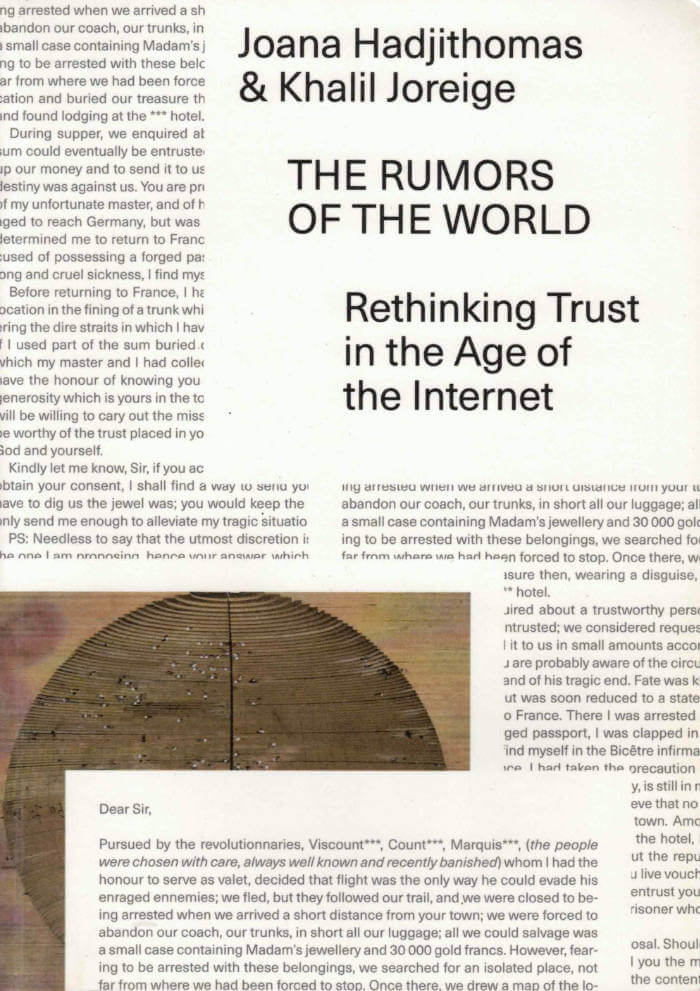
The Rumors of the World – Rethinking Trust in the Age of the Internet
Khalil Joreige, Joana Hadjithomas
This book traces the work and research of filmmakers and visual artists Joana Hadjithomas and Khalil Joreige and their exploration through their work of online spam e-mails, specifically, advance-fee frauds and scam messages.
This monograph presents material collected by the artists since 1999, focusing on the way that personal narratives are formed and articulated in a post-digital age. This work functions as a starting point for a broader discussion by leading scholars and thinkers on the nature of power and trust in the age of the Internet. Underlying this is an interrogation of faith: How has trust been recomposed by the Internet, and equally, how does the traditional practice of faith question the way that individuals relate to each other online?
Since the mid-1990s, Lebanese artists Joana Hadjithomas & Khalil Joreige (b. 1969, live and work in Beirut, Lebanon, and Paris) have worked together in the visual arts and cinema–shooting documentaries and fictions such as "I Want To See," starring Catherine Deneuve and Rabih Mroué and screened at the Cannes Festival in 2008.
Their practice in both fields is imbued with a distinctive aesthetic that occupies spheres of the visible and the fictional, nourishing a fascinating back and forth between life and fiction. Investigative processes, excavation, and the representations of historic, social, cultural, and political factors are at the heart of their practice. In their words: "All our work exists on the frontier of a reality where the question of the territory and its delimitation (that of art, that of personal life), the question of the social body and the individual body, are constantly being posed."
Their films have been multi awarded in international festivals and enjoyed releases in many countries. Their artworks have been shown in museums, biennials and art centers around the world, in solo or collective exhibitions and are part of important public and private collections, such as Musée d'Art Moderne de la Ville de Paris; Guggenheim, New York; Centre Georges Pompidou, France; V & A London, Sharjah Art Foundation, UAE, etc.
Edited by Omar Kholeif.
Contributions by Nicholas Auray, Finn Brunton, Joana Hadjithomas & Khalil Joreige, Henriette Huldisch, Omar Kholeif, Norman M. Klein, Eric Mangion, Laura U. Marks, Franck Leibovici, Sarah Perks, Jacques Rancière, Uzma Rizvi, Rasha Salti.

Citizens of the Cosmos
This book on the films of Anton Vidokle features essays and conversations by theorists, curators, and artists exploring the themes of technological immortality and resurrection informed by Cosmist philosophy.
Citizens of the Cosmos examines the artist Anton Vidokle's films and the Cosmist philosophy underpinning them. It features essays and conversations with Vidokle by seminal contemporary theorists, curators, and artists: Franco "Bifo" Berardi, Keti Chukhrov, Liam Gillick, Boris Groys, Daniel Muzyczuk, Miguel Amado and Georgia Perkins, Elizabeth Povinelli, and Raqs Media Collective. This is the first book to survey Vidokle's Cosmism-related filmic output, begun in 2014, and includes full scripts from the films.
The book's contributors speculate on Vidokle's Cosmist conceptions of technological immortality, utopian resurrection, museology, and space travel, grappling with how these ideas embroil or crystallize contemporary theories, practices, and technologies: atmospheric manipulation, cryonics, biopolitics, extraplanetary prospecting, geo-engineering, transhumanism, genetics.
Franco "Bifo" Berardi disagrees with the Cosmist conjecture of death as a flaw in the conception of the human being. Elizabeth Povinelli digests the life-nonlife mattering of dust through relationships to and from the human and more-than-human ancestors to come.
Boris Groys contemplates the gravitational forces between Cosmism and communism according to cosmic and social orders, grounded as they are in the laws of both physics and socialist politics. Keti Chukhrov considers the formation of thinking through madness, dying, and reasoning according to Cosmist philosophical and religious debates and beliefs.
Raqs Media Collective and Anton Vidokle discuss different cultures of death, finitude, and rituals. Miguel Amado and Georgia Perkins examine the in-betweeness of the categories of life and death through the designs of terraforming vehicles navigating interplanetary space travel.
Daniel Muzyczuk investigates Vidokle's interests in the context of the history of the collection at the Muzeum Sztuki in Łódź, while Liam Gillick and Anton Vidokle converse about filmmaking references and methods, from voiceover narrative to editing processes.
Edited by Miguel Amado. Contributions by Franco "Bifo" Berardi, Keti Chukhrov, Raqs Media Collective, Liam Gillick, Boris Groys, Daniel Muzyczuk, Miguel Amado and Georgia Perkins, Elizabeth A. Povinelli.

Raven Chacon: A Worm’s Eye View From a Bird’s Beak
Stefanie Hessler, Katya García-Antón and 1 more
A career-spanning catalogue featuring excerpts from Raven Chacon’s scores, musical prompts, and drawings interspersed with full-color documentation and descriptive texts of installations, sculptures, and performances. Raven Chacon is a composer and artist creating musical experiences that explore relationships among land, space, and people.
In an experimental practice that cuts across the boundaries of visual art, performance, and music, Chacon breaks open musical traditions and activates spaces of performance where the histories of the lands the United States has encroached upon can be contemplated, questioned, and reimagined. In 2022, Raven Chacon became the first Native American to win the Pulitzer Prize for Music, and was awarded a prestigious MacArthur “genius” fellowship in 2023.
Texts by Raven Chacon, Lou Cornum, Aruna D'Souza, Candice Hopkins, Anthony Huberman, Ingir Bål Nango, Marja Bål Nango, Dylan Robinson & Patrick Nickleson, Eric-Paul Riege, Sigbjørn Skåden, Ánde Somby.
Foreword by Katya García-Antón and Stefanie Hessler.

A Rage in Harlem – June Jordan and Architecture
Pennsylvania State Senator Nikil Saval tells the story of an unlikely partnership between June Jordan and R. Buckminster Fuller, and their attempt to reimagine Harlem in the wake of the 1964 riots.
In the tense days leading up to the 2020 American elections, design critic and then-candidate for Pennsylvania State Senate Nikil Saval addressed a virtual audience at the Harvard GSD to tell a story about Black feminist writer June Jordan and a little-known project that resulted from the aftermath of the 1964 Harlem riot. The events of police brutality and community grieving made a lasting impression on Jordan, who, while known for her work as a poet, playwright, and activist, responded with a proposal for a multiple-tower housing design. Through an unlikely partnership with R. Buckminster Fuller, Jordan's "Skyrise for Harlem" project offered a Futuristic vision for Harlem that argued for environmental redesign: "it is architecture, conceived of in its fullest meaning as the creation of environment, which may actually determine the pace, pattern, and quality of living experience." Jordan was not an architect in the conventional sense, Saval says. "But in the understanding of someone who sought to propose and build interventions in public space, she was."
Nikil Saval (born 1982) is an Indian-American magazine editor, writer, organizer, activist, and politician, member of the Democratic Party.
Foreword by Sarah M. Whiting.

yksihW kcalB
The 15-year history of the production of a "German scotch" Black Whisky, made by Dexter Sinister together with Stahlemühle, a distillery set up by former publisher, Christoph Keller.
The story is told in reverse, starting with the delivery of 342 bottles to Berlin in 2022, and ending with an interview with Christoph for the journal Dot Dot Dot in 2007, during which the idea began to germinate. A summary of the project is accompanied by photographs taken at the time, interspersed with five previously published texts (an essay, three conversations, and a statement of intent) written along the way.
Dexter Sinister is the compound name of David Reinfurt and Stuart Bailey, collapsing together distinctions of editing, design, production and distribution into one efficient activity.

Burn & Gloom! Glow & Moon!
Retrospective monograph: a journey through over two decades of intersectional and queering practices in film, performance, sculpture, community work, and textiles.
In Daschner's textile-based works, threads are minimal yet highly visible, akin to the pinch needed to wake up from a dream. These works—as well as her collages—merge with her confronting yet inviting image politics: she cuts and pastes stories of love and pleasure, violence and resilience, death and rebirth.
The written contributions reflect on Katrina Daschner as part of a hardworking generation of queer artists and makers who have been responding to the major conceptual shifts and gender upheavals happening in contemporary art since the 1990s, especially in New York and London. They highlight Katrina Daschner's longstanding line of intersectional queer interest that continues to undermine (neo-)liberal, heteropatriarchal conceptions of sexuality, gender, subjectivity, and relationships
Edited by Övül Ö. Durmuşoğlu.
Texts by Amelia Groom, Tim Stüttgen; foreword by Övül Ö. Durmuşoğlu; interviews by Rike Frank.

On the Table 6 – The Meal – A Conversation with Gilbert & George
Gilbert & George, Charlotte Birnbaum
Charlotte Birnbaum meets with Gilbert & George to discuss The Meal—a culinary performance organized in 1969 by the British duo, with David Hockney as the guest of honor. Also included here are photos and memorabilia from the singular event (the sixth publication in the On the Table series, that explore the encounter between food and art).
Gilbert & George never cook and always eat out. Back in 1969, however, the artist duo hosted The Meal, an elaborate dinner party that included thirteen guests, Princess Margaret's butler, a chef who prepared a meal from a Victorian cookery manual, and the guest of honor, artist David Hockney. While the art world of the time was largely characterized by Pop art, Minimalism, and Conceptual art, Gilbert & George developed an entirely unique philosophy and combined their daily lives with their artistic vision; in short, their art and life are one! Charlotte Birnbaum took a trip to London's East End to visit the immaculately dressed pair to discuss The Meal and other curious projects from their fifty-year collaboration. Also included here are photos and memorabilia from the singular event.

Feminist Takes – “Early Works” by Želimir Žilnik
The prospects of revolutionary feminism, from Želimir Žilnik's canonical film.
Canonical within the Yugoslav New Film of the late 1960s and the 1970s, Želimir Žilnik's Early Works (1968) follows the female revolutionary Jugoslava as she leaves her lumpenproletariat family to spread the teachings of young Marx and Engels among the peasants and factory workers. The violent responses to this proselytizing mission, which include the rape of Jugoslava and the beating of her three male comrades, invoke the repression of the 1968 student movement in socialist Yugoslavia. The film's allegorical examination of the contradictions of Yugoslav state socialism culminates when Jugoslava becomes the object of her comrades' violence, who shoot her and set her body on fire.
This edited volume, a part of Antonia Majaca's ongoing collaborative investigation Feminist Takes, initiates a discussion of the filmic—and historical—fate of Jugoslava and the prospects of revolutionary feminism.
From his beginnings in the lively amateur film scene of Yugoslavia in the 1960s, filmmaker Želimir Žilnik (born 1942, based in Novi Sad, Serbia) has gone on to make more than fifty films, including a number of feature films and TV productions, often in the genre of docudrama. He received international recognition early on, winning the Golden Bear for Best Film at the 1969 Berlin International Film Festival for Early Works. In the 1970s his films encountered political opposition, and he left Yugoslavia for West Germany, where he realized several independent films, including some of the earliest films dealing with the topic of guest workers. In the 1980s, after leaving Germany—due to his films once again facing political opposition and censorship—and returning to Yugoslavia, he made numerous TV and feature films through which he portrayed early symptoms of the country's growing social conflicts, continuing in the 1990s with films dealing with the maladies of the post-socialist transition as well as questions of migration.
Edited by Antonia Majaca, Rachel O'Reilly, Jelena Vesić.
Texts by Ivana Bago, Angela Dimitrakaki, Branislav Dimitrijević, Irmgard Emmelhainz, Rose-Anne Gush, Vesna Kesić, Vedrana Madžar, Antonia Majaca, Jaleh Mansoor, Ruth Noack, Bojana Pejić, Ana Teixeira Pinto, Rasha Salti, Kerstin Stakemeier, Jelena Vesić, Giovanna Zapperi.

Bad Infinity – Selected Writings
The most significant critical, theoretical, and art historical texts by the artist, writer, and filmmaker Aria Dean.
Compiled here for the first time, the selected writings of Aria Dean mount a trenchant critique of representational systems. A visual artist and filmmaker, Dean has also emerged as one of the leading critical voices of her generation, through a body of writing that maps the forces of aesthetic theory, image regimes, and visibility onto questions of race and power. Dean's work across media has long been defined by what she calls a "fixation on the subject and its borders," and the texts collected here filter that inquiry through digital networks, art history, and Black radical thought. Equally at home discussing artists who embrace difficulty—from Robert Morris to David Hammons, Lorna Simpson, and Ulysses Jenkins—and conceptual frameworks such as Afropessimism, Dean often contends with how theoretical positions brush against the grain of lived reality: how the Structuralism handed down from the academy, for instance, can be co-mingled with critiques of structural racism, or how Georges Bataille's notion of base matter transforms through an encounter with Blackness.
Dean's thinking embraces a definition of "Black art that luxuriates in its outside-the-world-ness," as she writes in this volume, which works to elucidate "Blackness's proclivity for making and unmaking its own rules as it produces objects" of cultural necessity. Originally published in November as well as in Texte zur Kunst, e-flux journal, and in exhibition contexts, the essays compiled in Bad Infinity were written over a six-year span that charts our rapidly evolving forms of subjectivity and sociality.
Aria Dean (born 1993 in Los Angeles ) is an American artist, critic, writer and curator. Her writings have appeared in various art publications including November (of which she is a founding editor), Texte zur Kunst, Artforum, e-flux, The New Inquiry, Art in America, Topical Cream, Cura., Mousse, Flash Art, Spike, etc.
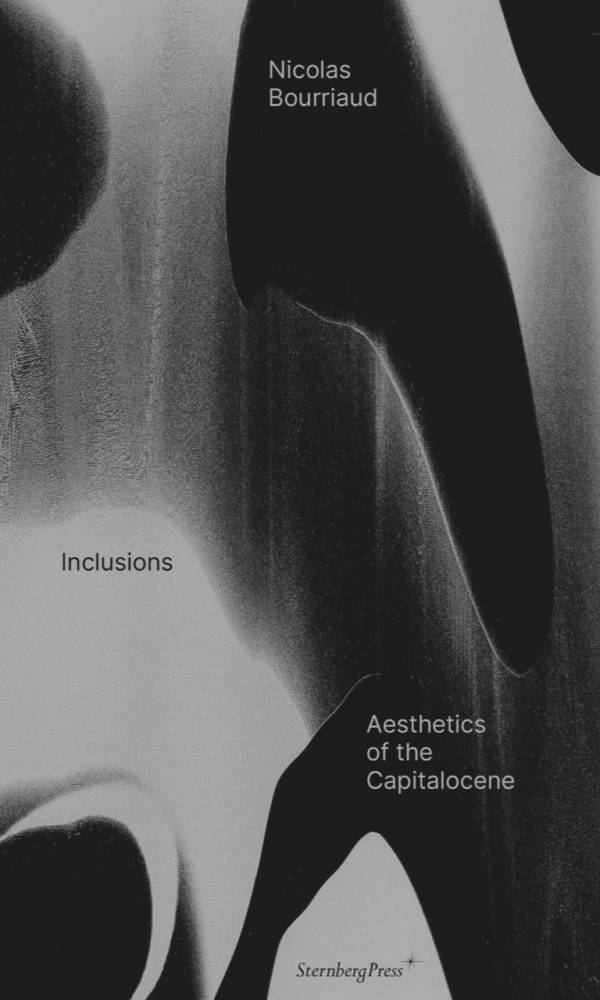
Inclusions: Aesthetics of the Capitalocene
The current ecological crisis brings about a new relational landscape: an unprecedented collapse of distances creates interspecies promiscuities and a crisis of the human scale. In Inclusions, Nicolas Bourriaud proposes that artists are the anthropologists of this new era.
"Today, the ecological catastrophe challenges us to rethink the space our societies have assigned to art. Creativity, critical thinking, exchange, transcendence, the relationship to the Other and to History are values intrinsic to artistic practice that will soon be of vital importance for the future of mankind. We need art to give a meaning to our lives, and the banks will not supply that. By attempting to unfold a few of the aesthetic figures floating in the global imaginary, this book intends to describe what is at stake in artistic activity in the age of the Capitalocene and to argue for it as a vital need."
Nicolas Bourriaud (born 1965) is a French curator, theoritian and writer.